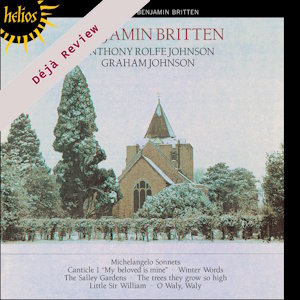
Déjà Review: this review was first published in September 2001 and the recording is still available.
Benjamin Britten (1913-1976)
Seven Sonnets of Michelangelo, Op. 22
Canticle I ‘My beloved is mine and I am his’, Op. 40
Four folksong settings: Down by the Salley Gardens, The trees they grow so high, Little Sir William, O Waly, Waly
Winter Words, Op. 52
Anthony Rolfe Johnson (tenor)
Graham Johnson (piano)
rec. 1985, St Barnabas’s Church, North Finchley, London
Hyperion CDH55067 [59]
If asked to think of a tenor whose voice has something of the timbre of Peter Pears, Anthony Rolfe Johnson’s would not immediately have come to my mind. But there are times when listening to this Hyperion reissue when he very nearly achieves Pears’ distinctive tone colouring. It isn’t easy to sing these songs when their creators’ own recordings act as immovable benchmarks. Listen to their HMV recording of the Michelangelo “Sonnets” and you hear Britten and Pears expressing their feelings for each other. How do you perform these songs convincingly without that dynamic?
The songs on this CD cover a period of thirteen fertile years from 1940 to 1953. The Michelangelo love sonnets were written during the couple’s stay in America in 1940. These are the first songs which Britten wrote for Pears. There are seven of them, all passionate; but for non-Italian speakers, with the passion masked by the Italian language. They make full use of Pears’ special type of coloratura, which Rolfe Johnson is able to match near-perfectly.
The First Canticle dates from 1947 and this time the composer’s feelings are not hidden by a foreign language – even its title proclaims this: “My beloved is mine and I am his”. But the object of Francis Quarles’ love was not another man, but his own God. Britten clearly found the text irresistible: “He gives me wealth; I give him all my vows / I give him songs, he gives me length of days”. Again, Pears’ coloratura tenor is emphasised, and Rolfe Johnson brings it off perfectly.
With the four folksong settings we move back to the years in America. Love is once more the theme, but this time there is tragedy. Rolfe Johnson’s poise and control in “Down by the Salley Gardens” is very beautiful indeed – in sheer quality of tone he is an easy match for Pears.
The Hardy settings, “Winter Words” date from 1952 when Britten’s style was becoming sparser. These are not the love songs of a young man, but those of one who is approaching middle-age, with its questions and uncertainties. The cycle opens and closes with songs reflecting on the passage of time. In “At day-close in November” the singer reflects on the trees he planted in “June time” which now “obscure the sky”. The final song, “Before Life and After”, ends with the question “Ere nescience shall be reaffirmed / How long, how long?”. Rolfe Johnson sings these well, but his young-sounding voice is much less convincing here. It needs one with more weight.
And what of Graham Johnson’s “role” as Britten? He plays wonderfully with great subtlety throughout these songs.
The recording is excellent, well-balanced and well-focused. Hyperion is to be congratulated on providing full notes on the songs, together with texts and translations.
Chris Goddard
Help us financially by purchasing from



















